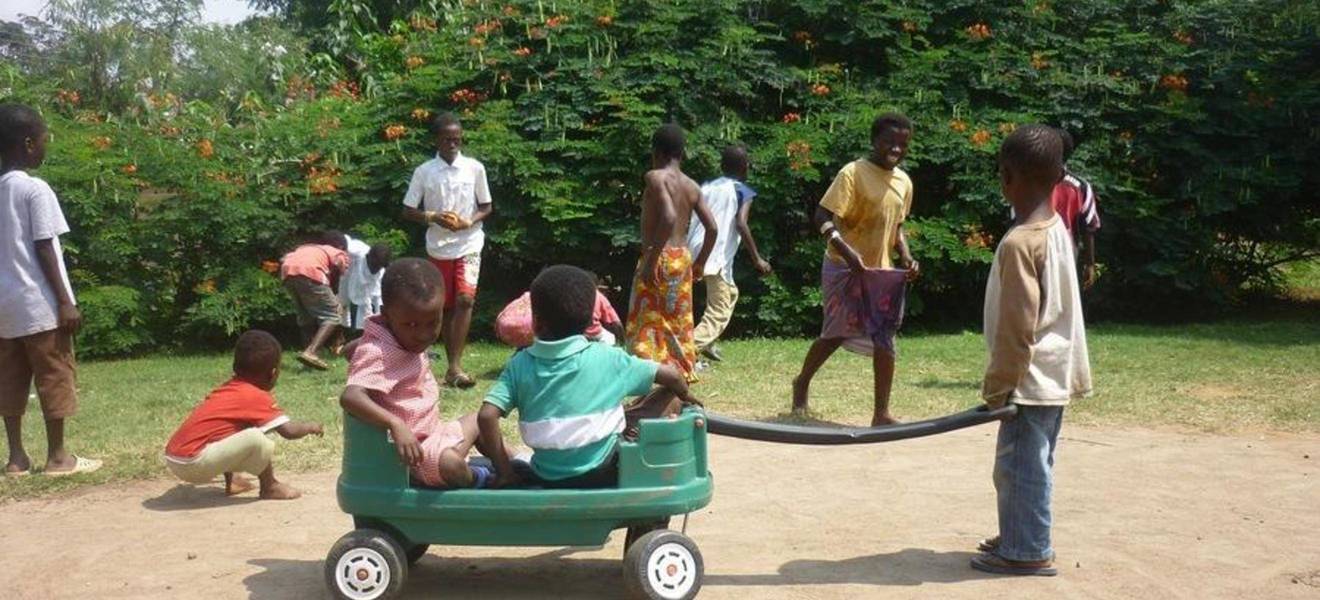01.08.2020/XNUMX/XNUMX / field reports
Voluntary service in street children Project in Ghana Field report
Tonight is my last evening here in Ghana. I was here for four weeks. The first dragged on, the rest passed by in a flash. I can still remember my first night well: I was completely helpless and overwhelmed. But in the time that I was here, I learned so much. I got to know a completely new culture. A culture where there is a lot of laughter and dancing. A culture where people are open and happy with what they have. So the little boy can be happy about my water bottle.
Chantal's time in Ghana
Chantal helped out for four weeks in our street kids project in Ghana. Here are excerpts from her exciting report. You got curious? You can find the complete report as a download file.
Ghana se'w Akwaaba! (Welcome to Ghana!)
I am standing in a large room with 3 beds, two of which can be occupied twice. A large mosquito net hangs over each one. The air is muggy and smells different: a mixture of seawater, exhaust fumes and a typical smell that I only know from hot countries. There are no window panes, only a grid and wide glass blinds close the window. A fan provides some fresh air.
It's a big mess and I don't know where to put my suitcase, backpack and bag. I was expecting a few other volunteers, but no one is there. Despite this, all beds are made and appear to be occupied. George, one of the organization's helpers, explains to me that the others are probably in the exit. He kindly shows me one of the occupied beds, asks if I can manage on my own and then leaves. Now I feel completely alone. Since it's already late, I want to take a shower and then go to bed immediately.
But first I have to get used to the condition of the bathroom: there is no shower head, only a bucket of water with a bucket is in the bathtub. After the awkward shower I feel even dirtier than before. The bottom of the bathtub is damaged and therefore brown and sandy. As soon as I get out of the tub, my feet are dirty again. The water doesn't run off, not even in the sink. There is no toilet paper and the flush doesn't work either. It's my first night here and I feel like I've already reached my limits.
Everything is different in Ghana
If you want to travel to Africa, you should be aware that life there cannot be compared to that in Switzerland. It's not just the high humidity, the traffic that seems chaotic to us and the poorer conditions that completely change everyday life. It's also the people who are much more open and spontaneous than here.
Strangers are already spoken to on the plane and anyone walking through the streets hears "Akwaaba" (Welcome) again and again. The children call out "O'Obrouni" (white/r) from all angles, preferably with a smile waving and responding with an "O'Obibini" (Black) People who are close to you are addressed with kinship terms such as Mama, Sister, Uncle, etc.
Power outages and water outages are simply part of everyday life. The streets and houses are often dilapidated and dingy. Trade takes place everywhere on the streets, there are only large shopping centers in the big city in the tourist district. And money may only be given with the right hand, the left hand is considered unclean, because the right hand is used to eat and the left to do everything that gets your hands dirty.
Although there are positive and interesting aspects, it is possible that someone who arrives all alone in the middle of the night in Accra and has never been there before, is suffering from a culture shock. That's the way it was for me.
Arrival in Accra
Accra is the capital of Ghana and thus the economic and administrative center. According to my travel guide, the city has around 2.291.300 inhabitants and is located directly on the coast in southern Ghana. I'm picked up at Kotoka International Airport by George, whom I can only recognize thanks to the bright yellow t-shirts we're both wearing. During the flight I read in the travel guide that people should laugh a lot in Ghana. People should have the gift of being able to laugh at themselves. This proves George.
George is a thin, not very tall, dark-skinned man with a mischievous smile. He is an employee of the organization who mainly takes care of us volunteers during the first week, during the orientation program. So it happens that he is also the one who picks me up at the airport with the car and a driver and first takes me to Mama Mina. She is the main person in charge of the organization's Ghana team, the mother of all mothers.
During the 5-day orientation program it is her job to prepare us for life in Ghana by conducting several workshops, but I would like to tell you more about that later. New volunteers arrive every day, who then start the introductory week in groups.
On the way to her, George tells me about his country in an amusing way. Music is a big and important part of their culture. There is a lot of singing and dancing, both at festivals and in everyday life. Then he explains to me that although English is the official language of Ghana, it is hardly anyone's mother tongue. Countless dialects are said to be spoken in Ghana. These can be summarized in over 50 languages. In Accra they speak Twi. He then teaches me the supposedly most important words in Twi: "Akwaaba" means welcome. So when Mama Mina greets me like that, I should reply with a friendly "Yjena" (=thank you). But I should thank a man with "Jetscha".
I am warmly welcomed by Mama Mina. In her nightgown she presses me very tightly against her plump body. After we both briefly introduced ourselves, she goes back to bed. I'm driven to Mama Irene, where I'm finally supposed to sleep.
The organization RGV
Rainbow Garden Village, RGV for short, is a German organization for participants from all over Europe. They mainly offer internships abroad and volunteer work in Africa and Asia. Each of the eight countries has its own local team: Ghana, Togo, Uganda, Tanzania, Namibia, South Africa, Nepal and Thailand. The organization makes a very competent impression. If you have any questions or problems, you can contact the appropriate person who offers good assistance. In general, the handling is very familiar.
Both in my documents and on the organization's homepage, there is often talk of a "internship house" or a "student house", but this should not be taken literally. For reasons of space, this does not exist at all. During the first week, the volunteers live with different host mothers. For example, I live with Mama Irene.
I only live with Mama Florence from the second week. Nevertheless, I spend most of the day with Mama Mina because we take part in the orientation program during the day and also get our breakfast and dinner at her place. Not because Mama Irene doesn't feel like cooking, but for two other reasons. First, it is common for Mama Mina to eat during the orientation program, presumably to strengthen the family environment and get to know each other. Secondly, according to other volunteers, Mama Irene's age is 94 years. Nevertheless, she lives alone in a big house with a chicken coop and offers us a bedroom.
Volunteer work in street children project
The street children project started about a year ago. At that time, about 30 street children came to Mama Mina's garden every day, where they sang songs, made handicrafts, played and painted together with some volunteers. Some time later, the children began to be divided into classes in which they learned math and English.
It was discussed what the children should learn in which classes and how best to teach the children. Lessons took place outside at small wooden tables, just like today. A volunteer who was working at the time studied social pedagogy and supported the others in planning the lessons and using the learning methods. This is how the first counting frames with corks or beer mats, threaded on a string, were created. But over time, many children have gone back north with their parents, where they came from. That's why today there are only between five and fifteen children, depending on the weather and the mood of the children.
Basically, the program is structured and specified how each morning should proceed. Maj-Britt then finally wrote down this plan, along with well-known songs, games and important rules, so that future new volunteers can adopt the structure.
Activities in the street children project
Everyone should be present at eight, then a game is played before the lesson begins at half past eight. The teaching units take a long time, so variety is important. There is a long break at ten o'clock. Then everyone gathers in a large circle where songs are sung. Then they have classes until twelve o'clock. When they finally tidy everything up, they get lunch, usually rice or beans with gravy. Before they eat, a long grace is called, then they scoop the food into their mouths with their fingers. At 13:00 p.m., everyone goes home.
Since the children don't know their age themselves, we can only estimate it. Most are between three and twelve years old. The little ones are still too young to attend classes. Therefore, they are allowed to play while the rest of the children have math and English lessons.
My last evening & review of my volunteer work
Tonight is my last evening here in Ghana. I was here for four weeks. The first dragged on, the rest passed by in a flash. I can still remember my first night well: I was completely helpless and overwhelmed. But in the time that I was here, I learned so much. I got to know a completely new culture. A culture where there is a lot of laughter and dancing. A culture where people are open and happy with what they have. So the little boy can be happy about my water bottle.
I can't get out of my head what Mama Mina always taught us: You should appreciate the small in order to achieve something big. Because if you don't appreciate the small, you don't deserve the big.
Voluntary service in street children project in Ghana, excerpts of the report by Chantal R.
More projects that interest you could
Have you not yet discovered a suitable program for your time abroad? No problem, we will present you more Volunteer projects abroadthat might pique your interest.
Are you perhaps still at the beginning of thinking about your trip and have no idea what might be right for you? Whether you want to go abroad as a volunteer for a short time, or if you prefer FSJ up to 12 months abroad afford? Maybe there is one Internship abroad in a specific subject area the best way for you to gain experience abroad?
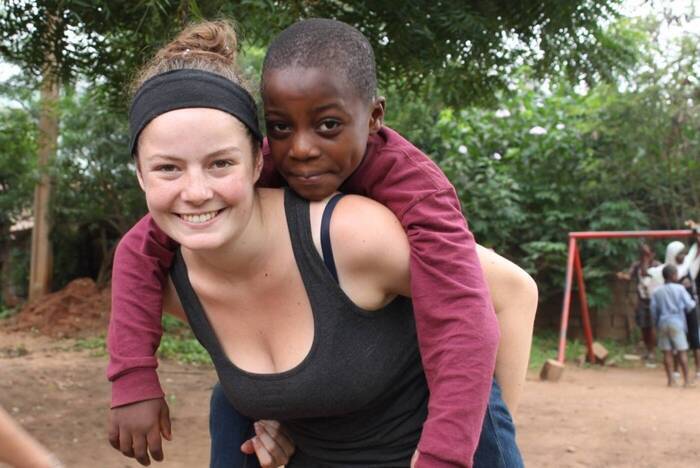
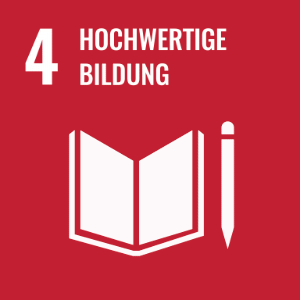
Ghana | childcare
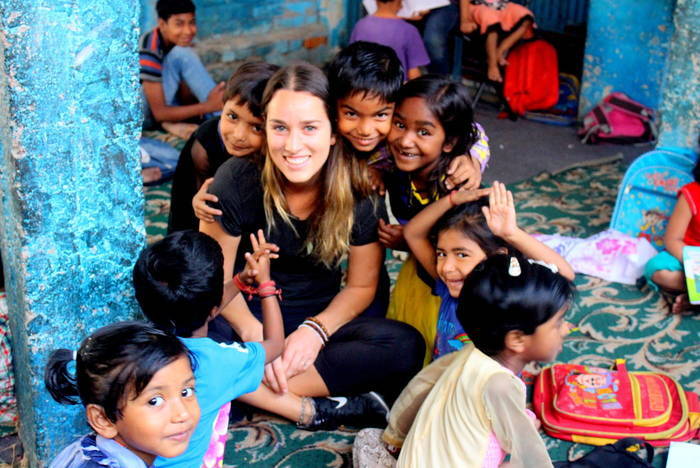

India | Teach
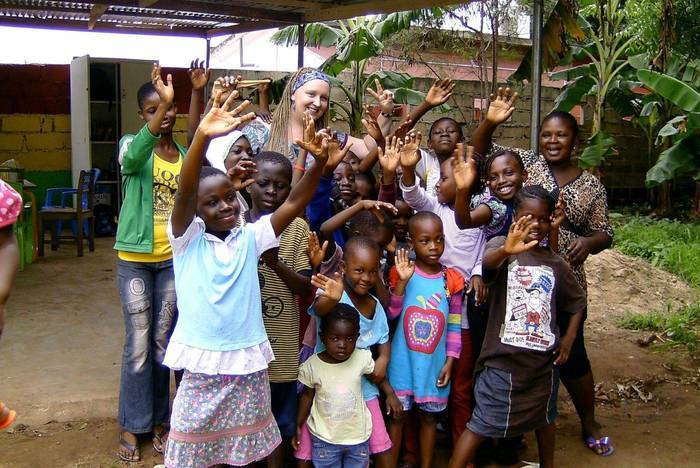

Ghana | childcare
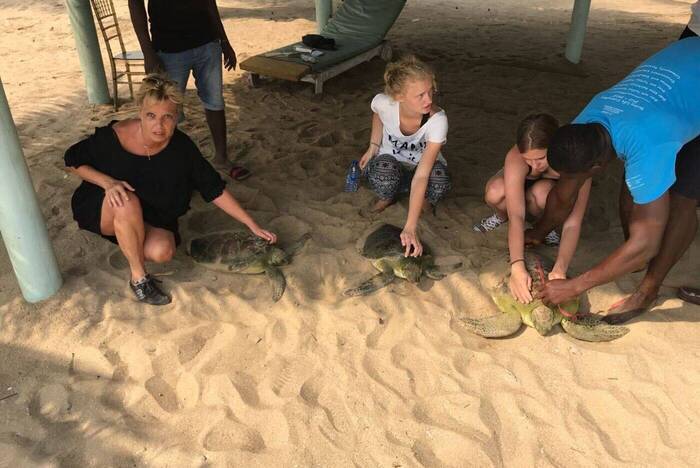
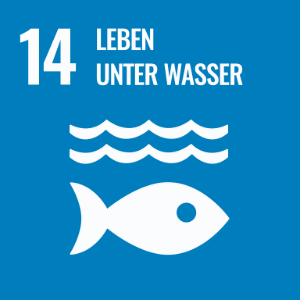
Ghana | environmental Protection
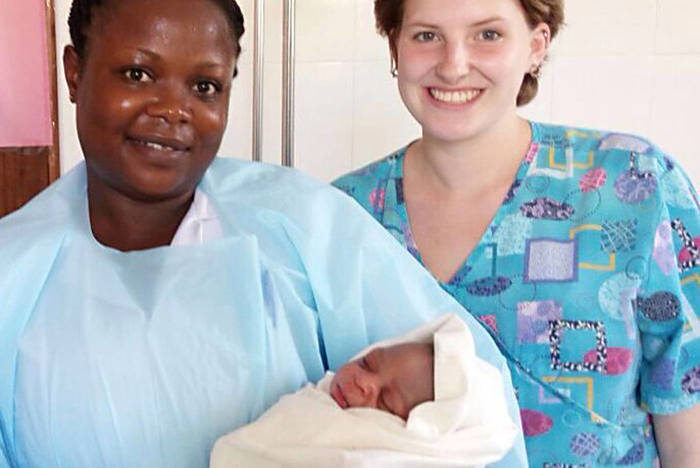
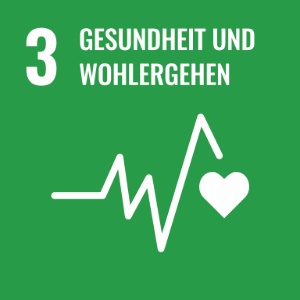
Ghana | obstetrics

